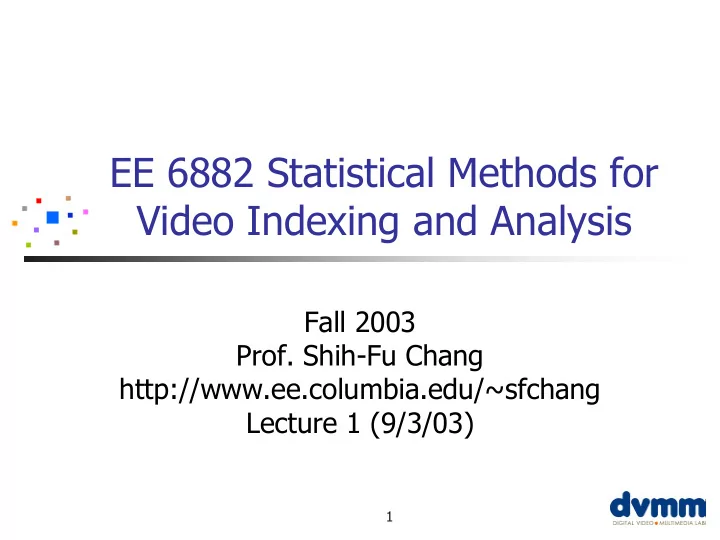

EE 6882 Statistical Methods for Video Indexing and Analysis Fall 2003 Prof. Shih-Fu Chang http://www.ee.columbia.edu/~sfchang Lecture 1 (9/3/03) 1
Research Problems in Video Indexing and Analysis � Object detection and recognition (e.g., face, text, vehicles) � Structure parsing (e.g., breaking videos into shots, scenes, and stories) � Event detection (e.g., sports events, human activities, meetings, medical) � Search and retrieval (e.g., interactive search with feedback) � Synthesis (e.g., personal summaries, highlight generation) EE6882-Chang 2
Object recognition and structure parsing story shot anchor shot EE6882-Chang 3
Statistical Methods � Emerging mature tools and promising performance � Increasing computing resources � More challenging, interesting problems � Increasing benchmark data (e.g., NIST TREC Video) EE6882-Chang 4
Why this course? � Learn insights of different tools and models � Understand match between tools and problems in this field � Get some experience on tools publicly available and from DVMM Lab � Related hard-core courses, see web site EE6882-Chang 5
Papers to Study � Problems � Image/video classification � Interactive image retrieval � Video structure parsing � Multimedia data mining � Techniques � Bayesian, factor graph, graphical model � HMM and variations � SVM � Hierarchical Mixture � others EE6882-Chang 6
SPR System Architecture (From Jain, Duin, and Mao, SPR Review, ’99) EE6882-Chang 7
Feature Representation Extraction/Selection (Jain et al 99) Fischer Analysis PCA MDS Kernel PCA EE6882-Chang 8
Issues to Consider � There are no universally optimal classifiers! � Statistical structures of problems and models (dependence, features, scale, etc) � Generation vs. discrimination � Feature representation and selection � Amount of training/test data � Performance estimation and comparison � Online vs. offline � User supervision/feedback EE6882-Chang 9
Curse of Dimensionality and Overtraining Rule of thumb -- # of training patterns per class / # of features > 10 EE6882-Chang 10
� A few examples from paper list EE6882-Chang 11
Bayesian Image Classification (Valaiya et al) EE6882-Chang 12
Bayesian Image Classification Feature independence MAP Classification VQ as distribution estimator EE6882-Chang 13
Concept (In)Dependence (Naphade et al) EE6882-Chang 14
Boosting (Tieu and Viola) Extract > 45K selective efficient features by multi-scale filtering Classifier combination and sample re-weighting EE6882-Chang 15
Boosting retrieval interface User selected examples 20 retrieval results Real-time evaluation of 20 features over millions of images Negative images in the training set close to decision boundary Images in the testing set close to the decision boundary EE6882-Chang 16
Maximum Entropy Fusing τ (Hsu and Chang) Objective: a boundary at time ? � k τ = { shot boundaries or significant pauses} � k observation time τ − τ + τ k 1 k 1 k {video, audio} a static face? motion energy changes? change from music to speech? speech segment? {cue words} i appear {cue words} j appear EE6882-Chang 17
Object-Word Correspondence (Duygulu et al) EE6882-Chang 18
Unsupervised Video Structure Discovery: Hierarchical Hidden Markov Model (Xie et al) � Learning Multi-Level Markovian Temporal Dependence High-level states represent distinct events � Presence of each event produces observations modeled by low-level HMMs � Baseball running pitching top-level Example states break bottom-level states … … … time 1 st base field bench pitcher batter audience bird view close up EE6882-Chang 19
Course Format � Reading seminar � 2 papers reviewed and demonstrated each week (class size will be limited) � Each student assigned one paper � assignments determined 2-3 weeks in advance � Everyone writes comments before and after class on personal web sites � Term project at the end of course (12/10/03) -- target at conference paper submission EE6882-Chang 20
Paper review and demo � Each paper allocated 60 mins total � Discuss paper and plan demos with me and TA before class � Prepare copies of slide handouts before class, or make them available online � Computer demo of the reviewed method using toy data set EE6882-Chang 21
Paper Review and Demo (2) � Review � Background review and examples � Problem addressed and main ideas � Insights about why it works � Limitation, generality, and repeatability � Alternatives and comparisons � Demo � Software and data available and repeatable? � Reconstruct the method and try on toy data set? (from some publicly available generic toolkit) � Analysis of results (not just accuracy numbers, offer explanations and verifiable theories about observations) � Demo code archived on class site and shared with others EE6882-Chang 22
Required background � Familiarity with � Image processing or computer vision � Statistical pattern recognition or machine learning � Computer programming (e.g., Matlab) � Background assessment given in the first class � video representation, features, and statistical concepts EE6882-Chang 23
Grading and Credit � 25% paper review, 25% demo, 25% class participation, and 25% term project � Auditing permitted only � for non-students � with active, continuous class participation EE6882-Chang 24
Class Resources � How to read/present/write a research paper? (see links on web site) � Software links on web site to HMM, Netlab, SVM, and Bayesian Network � Image/video data and features from DVMM lab EE6882-Chang 25
Schedule � Available on the web site � Next 2 lectures (need volunteers) � Image classification (9/10, work with me and TA) � Bayesian Methods (Vailaya, Jain, and Zhang) � Factor Graph (Naphade and Huang) � Boosting (9/24) � Freund & Schapire, Tieu and Viola EE6882-Chang 26
Goals � Everyone learns insights and experience in this emerging field � Accumulate tools and reports � Construct a self-contained reading and experimentation learning set for statistical video indexing/analysis EE6882-Chang 27
Recommend
More recommend